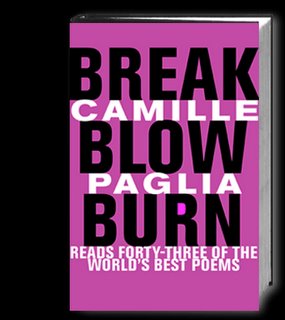
Break, Blow, Burn is written with clarity and zip, and though I have a sort of unconditional admiration for criticism this tangy and confrontational, it's hard not to feel fatigued and bullied after spending more than thirty minutes with this book. Paglia is a polemicist. She's a pot stirrer. And thanks to pot stirrers all sorts of interesting questions can bubble up to the surface. But pot stirrers, at their best, do work that is preliminary. And pot stirrers, at their worst, get hung up making points that seem, y'know, nutty. Take this, the penultimate paragraph of Paglia's introduction:
At this time of foreboding about the future of Western Culture, it is crucial to identify and preserve our finest artifacts. Canons are always in flux, but cannon formation is a critic's obligation. What lasts, and why? Custodianship, not deconstruction, should be the mission and goal of the humanities. As a student of ancient empires, I am uncertain about whether the West's chaotic personalism can prevail against the totalizing creeds that menace it. Hence it is critical that we reinforce the spiritual values of Western art, however we define them. In the Greco-Roman line, beauty and aesthetic pleasure are spiritual too. Poetry does not simply reconfirm gender of group identity; it develops the imagination and feeds the soul. (xviii)
Since when is "Western Culture" in danger? I mean, I think I know what she's talking about, but I find it totally offensive. And who on earth would argue that poetry doesn't "develop the imagination and feed the soul"? Is this really what she thinks critics interested in deconstruction are ultimately saying?
Despite the very obvious and distracting and sometimes disturbing polemics of the introduction, the book does offer up some very pleasurable word by word and line by line readings of poems that many readers are not likely to have visited recently. Although there are -- I think -- noticeable omissions in her selection of contemporary poets , her readings of Donne, Herbert, and Shakespeare are spirited and interesting. It's lovely to linger in the poems -- to savor their diction and music. And re-reading the poem from which Paglia gets her title -- John Donne's Holy Sonnet XIV -- is quite a thrill. And though one could of course just go read John Donne, I have to give Paglia props for her daring reading of the poem, concluding that "We will never be pure until we are abducted and raped by God." Yeah, she's a pot stirrer.
I haven't finished reading the book, and if my habits these days are any indication, I tend more to "read around" in several books at once and never finish any of them. But I'm gonna go and see what Paglia is like in person. She's reading @ Bookpeople here in Austin on March 14 (in between AWP and SXSW -- March is busy in these parts).
If you're interested, you can also check out Camille Paglia's website, which (I think) looks like an astrologer's website. Weird.
Despite the very obvious and distracting and sometimes disturbing polemics of the introduction, the book does offer up some very pleasurable word by word and line by line readings of poems that many readers are not likely to have visited recently. Although there are -- I think -- noticeable omissions in her selection of contemporary poets , her readings of Donne, Herbert, and Shakespeare are spirited and interesting. It's lovely to linger in the poems -- to savor their diction and music. And re-reading the poem from which Paglia gets her title -- John Donne's Holy Sonnet XIV -- is quite a thrill. And though one could of course just go read John Donne, I have to give Paglia props for her daring reading of the poem, concluding that "We will never be pure until we are abducted and raped by God." Yeah, she's a pot stirrer.
I haven't finished reading the book, and if my habits these days are any indication, I tend more to "read around" in several books at once and never finish any of them. But I'm gonna go and see what Paglia is like in person. She's reading @ Bookpeople here in Austin on March 14 (in between AWP and SXSW -- March is busy in these parts).
If you're interested, you can also check out Camille Paglia's website, which (I think) looks like an astrologer's website. Weird.
3 comments:
It does look like an astrologer's website. Did you look at her wolrd's best lists? She's way off mostly, but the movie quotes one is good.
Paglia is nut-tastic. How many other lesbian feminists have based their careers on insulting women and insisting that homosexuality is unnatural? (http://www.salon.com/people/col/pagl/2001/05/23/oil/index.html)
I try to like her, but her Salon pieces are 50% self-promo and 50% backstabbing other critics. Fun reading, but not exactly constructive.
I'm reading this book right now. I read one or two entries a day, because that's all I can take. I'm sort of new to poetry and, regardless of her viewpoints, she is an enthusiastic navigator so so far I'm enjoying it.
I saw her speak when she came to Chicago. Get ready to be exhausted. The woman can talk endlessly about anything and barely catches a breath. But she can be a lot of fun.
Post a Comment